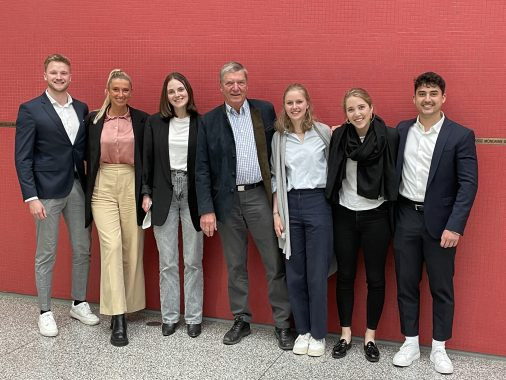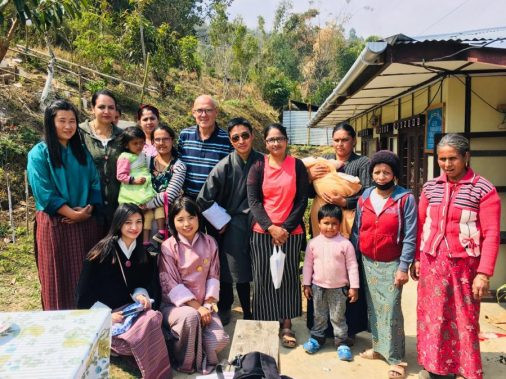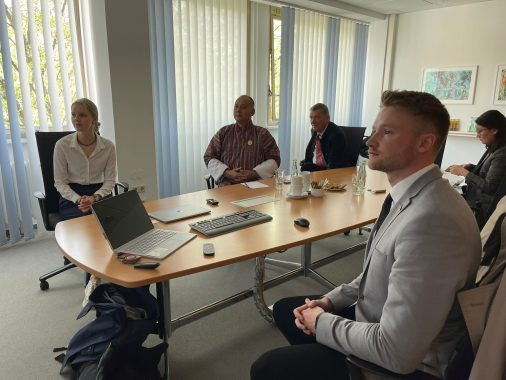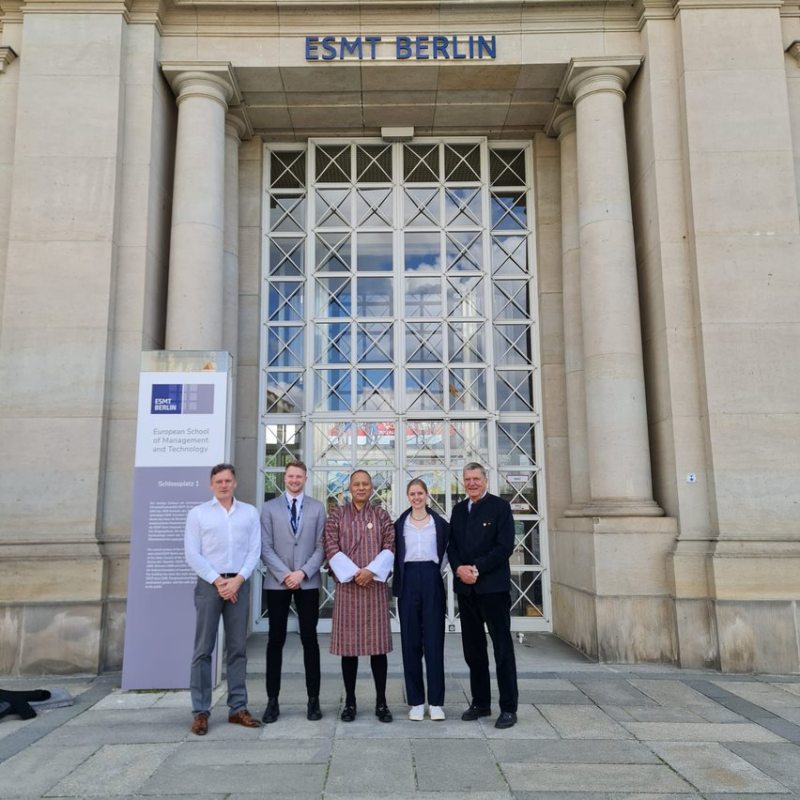The future of rural Bhutan – promoting green finance projects

We are currently in our second year of the ESMT Berlin Master in Management program and just completed our Social Impact Project (SIP). The SIP is an obligatory five-week project which provides us with the opportunity to choose an organization with specific social impact objectives, and work with them as economic or management consultants.
In early December 2021, our team read an interesting article about the German Sparkassenstiftung for International Cooperation, which is the development-policy branch of the Sparkassen-Finanzgruppe. The goal of the cooperation is to provide people in developing countries and emerging economies with access to financial services, which promotes economic inclusion and creates opportunities to leave poverty behind.
German Sparkassenstiftung currently works in over 50 countries in Africa, Latin America, Southeast Asia, Central Asia, Europe, and the Caucasus.
We were impressed by their work and contacted them about a collaboration for our Social Impact Project 2022. We met with Ilonka Rühle-Stern, head of division Asia, who presented us with an interesting project in Bhutan – a beautiful and impressive country that was unknown to most of us.
The project scope and goal
We immediately felt a positive connection to the project and were interested in learning more about Bhutan. After joining the project, we contacted Tshering Dema, deputy CEO of RENEW Microfinance.
Founded in 2004, RENEW (Respect, Educate, Nurture and Empower Women) is a civil society organization dedicated to the empowerment of women and girls in Bhutan, in particular, victims and survivors of domestic and gender-based violence.
In 2012, they introduced the RENEW Microfinance (MFI) project with the objective to become a leading provider of financial services to low-income women and their families in Bhutan. They aim to build a long-term sustainable solution for providing financial services to people in need in remote areas, educate rural people on financial products and services, and impart knowledge on income management.

Methodology
By following Bhutan’s commitment to remain carbon neutral, where emissions do not exceed the sequestration capacity of its own forests, the goal of our SIP was to incorporate green finance options into RENEW MFI’s investment portfolio and mobilize finance for Bhutan’s sustainable development goals.
To achieve this goal, we conducted a comprehensive database of potential green finance options for RENEW MFI, segmented by client type, geolocation, income-generating potential, environmental and social impact, as well as feasibility for implementation.
We then conducted a profitability analysis for each of the green finance investment options, divided into the two areas of multipurpose and agriculture loans. We visualized the findings of our analysis in Microsoft Excel and Microsoft Power BI, which then led to concrete recommendations on which projects RENEW MFI should adopt into their existing loan portfolio. Synergies with existing loans were taken into account and incorporated into the recommendations.
Recommendations
We recommended RENEW MFI invest in the following four green finance investment options:
Recommendation 1: Biogas
In Bhutan, fuel wood is still predominately used for cooking in rural households; liquefied petroleum gas (LPG), kerosene, and electricity are widely used for cooking by urban households (90%). Fuel wood consumption contributes to deforestation, greenhouse gas emissions, and smoke with adverse health effects on households. All the fossil fuels including LPG and kerosene are imported as Bhutan does not have any known fossil fuel resources. It is, therefore, necessary to explore the possibility of alternative and sustainable energy sources, which is why we implemented a biogas pilot project. Biogas is an environmentally friendly and renewable energy source.
Recommendation 2: Rainwater harvesting
Rainwater harvesting is defined as a method for inducing, collecting, storing, and conserving local surface runoff for agriculture in arid and semi-arid regions. It is a particularly suitable technology for areas where there is no surface water, the groundwater is deep or inaccessible due to hard ground conditions, or where it is too salty or acidic.
While Bhutan has a high per capita availability of water, the distribution of this resource over the seasons and across rural areas is an issue. This is why we recommended investing in rainfall harvesting. Rainfall can provide some of the cleanest naturally occurring water that is available. There is considerable scope for the collection of rainwater when it falls, before huge losses occur due to evapotranspiration and before it becomes contaminated by natural means or man-made activities.
Recommendation 3: Polyhouse
Greenhouse and polyhouse structures are used to grow crops more efficiently, making use of a created micro-climate. Although they function in the same way, the main difference between a green- and a polyhouse is the type of cover (a greenhouse uses mainly glass and a polyhouse uses a polyfilm).
Polyhouse farming is more economical in comparison to polycarbonate and glass-covering structures. Polyfilm sheets separate the internal environment from the outside environment. Before, polyhouses used wooden frames, but modern polyhouses are using other materials such as galvanized iron pipes. Such materials can withstand harsh weather conditions even if the size of the polyhouse is comparatively small.
As the polyhouse requires less expensive resources, it is the more feasible option for the rural population of Bhutan.
Recommendation 4: Hydroponics
Hydroponics is derived from combining the two Greek words “hydro” (water) and “ponos” (labor). It is the process of gardening in liquid nutrient cultures without using soil. In the absence of oil, water provides the plants with nutrients, moisture, and oxygen. Anything from watermelons or jalapeños to orchids thrive using hydroponic systems. Moreover, these systems require minimal space and 90% less water than traditional agriculture.
With an intelligent and modular design, hydroponic gardens can grow fruit, flowers, and vegetables in half the time, making this our fourth recommendation for investment.
Challenges
The main challenge we faced during our SIP was the cultural disconnect, as we were not able to travel to Bhutan, due to the ongoing lockdown of the COVID-19 pandemic.
This meant that we initially had difficulties envisioning our impact and seeing the direct challenges of the investments we proposed. However, we managed to overcome these challenges by having regular meetings and ongoing communication with our Bhutanese counterpart, as well as with the support of the German Honorary Counsel of Bhutan Dr. Wolfgang Pfeiffer.
Members of our team with the Bhutanese ambassador and Dr. Wolfgang Pfeiffer at ESMT Berlin.
In January 2022, we anticipated that traveling to Bhutan could become difficult, due to the ongoing lockdown. Therefore, we contacted Dr. Pfeiffer, elaborating our project proposal and asking for his support.
From February 2022, we had regular meetings with him, not only to get to know the Bhutanese culture, but also to learn important details about the country’s state of development. From the beginning of the project, Dr. Pfeiffer and the German NGO Bhutan Hilfe e.V. became important stakeholders in our project. Without their help, important steps for gathering relevant information for our report would not have been possible. We would like to thank Dr. Pfeiffer, Dr. Klaußner, and Mr. Schlichtenmayer sincerely for their support.
Learnings

The main point that we learned from the SIP is that proposing green finance options is not enough! For long-term success and the sustainable development of the Bhutanese country, RENEW MFI needs to educate its clients about climate change from early on.
We also learned that for a profitability analysis for green investment options, many steps have to be accomplished before deriving appropriate recommendations. Moreover, we as a team learned to work together with various stakeholders, counterparts, clients, and partners in Bhutan, which was sometimes challenging but helped us to understand the country even more.
And last but not least, Dr. Pfeiffer told us in one of our first meetings that once you have engaged with this beautiful country, it won’t let you go. Although we have not yet visited the country, we now know exactly what he meant.
Written by Jan Malte Jeddeloh, Alexa Motte, Isabelle Schrey, Anna Wannhoff, Cosima Weiss, and Adrian Willig
